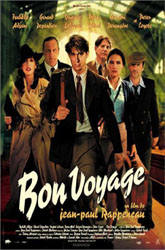 Director:
Jean-Paul Rappeneau
Starring:
Isabelle Adjani
Gérard Depardieu
Virginie Ledoyen
Yvan Attal
Grégori Derangère
Peter Coyote
Jean-Marc Stehlé
Release: 19 Mar. 04
IMDb
|
Bon Voyage 
BY: DAVID PERRY
Jean-Paul Rappeneau’s stuffy melodrama Bon Voyage may share a
title with a 1960s Disney movie, but don’t worry, no film is more
retrogressively maddening than this French film. As if intent on slapping
Jean-Luc Godard and his Cahiers du Cinema cohorts, this film not only takes
the supposedly carefree setting of the 1940s French film industry, but also
embodies the very Tradition of Quality that André Bazin’s publication tried
to disinherit from the French cinematic mindset (it’s so far off-base, that
one is tempted to connecting to the even more disingenuous White Telephone
films of pre-war Italy).
And while I recognize that Rappaneau is waxing poetically in the styles of
the time, I also wonder what pleasure I can get out of a film based on a
film technique that wasn’t particularly engaging in the first place.
Melodramatic to the core, these overbearing productions formidables
had less to say about life than a Joey Lawrence autobiography, and often had
acting of the “Whoa” caliber, too. Painfully realized by Rappeneau, the
effect is a quizzical hodgepodge of fine actors (from Isabelle Adjani to
Virginie Ledoyen to Gérard Depardieu) who can barely make their way through
the costumes and sets. What this film needs is someone who can truly chew
the scenery (Brian Cox? Marlon Brando? Al Pacino?) to make way for any
effective storytelling here.
And irony isn’t the intentions Rappaneau had when making this, at least as
far as I can see. This isn’t Far from Heaven, another film built on a bygone
aesthetic, because it lacks the self-control to criticize the demon without
becoming it. I have little tolerance for even the canonized Douglas Sirk (I
can only take La Habanera in small doses), whose positioning within the
American Tradition of Quality was never near as thoughtful or intense as,
say, Samuel Fuller.
Rappaneau’s film exists somewhere in the spectrum under Sirk, knowing what
its doing but not fully realizing its potential as a commentary. Collect all
the finest technicians in France without taking a moment to look for
writers, and this is what you’ll get. Something tells me, all they needed to
do to save this film was send a draft over to Postif or the redesigned
Cahiers du Cinema.
 |

